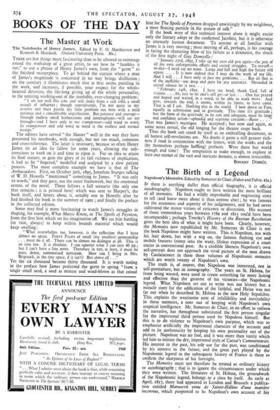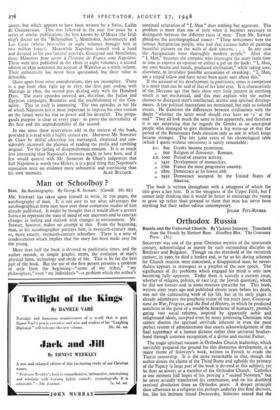The Birth of a Legend
Napoleon's Memoirs. Edited by Somerset de Chair.(Faber and Faber. 42s.) IF there is anything duller than official biography, it is official autobiography. Napoleon ought to have written the most brilliant of all memoirs. He had a wildly improbable and engrossing story to tell (and knew more about it than anyone else); he was famous for the acuteness and asperity of his judgements, and he had never cultivated the minor virtues of reticence or discretion. His account of those tremendous years between 1789 and 1815 could have been incomparable ; perhaps Trotsky's History of the Russian Revolution gives the best idea of what it might have been. Clearly, however, the Memoirs now republished by Mr. Somerset de Chair is not the book Napoleon might have written. This is Napoleon, not with his hair down, but with a wig on, the famous flashing eye and mobile features frozen into the waxy, lifeless expression of a court statue in conventional pose. As a credible likeness Napoleon's own self-portrait does not approach the vivid picture of the man drawn by Caulaincourt in those three volumes of Napoleonic memoirs which are worth twenty of Napoleon's own.
The truth is, of course, that Napoleon was interested, not in self-portraiture, but in iconography. The years on St. Helena, far from being wasted, were used to create something far more lasting and effective than the greatest of his victories—the Napoleonic legend. What Napoleon set out to write was not history but a miracle story for the edification of the faithful, and Heine was not far out when he described St. Helena as the new Holy Sepulchre. This explains the wearisome note of infallibility and inevitability in these memoirs, a note out of keeping with Napoleon's own sceptical intelligence. Mr. Somerset de Chair, in an effort to enliven the narrative, has throughout substituted the first person singular for the impersonal third person used by Napoleon himself. But this is to do violence to Napoleon's own purpose which was to, emphasise artificially the impersonal character of the account and add to its authenticity by keeping his own personality out of the picture. Napoleon was no fool, and it was more than vanity which led him to imitate the dry, impersonal style of Caesar's Commentaries. His interest in the past, his sole use for the past, was conditioned by his interest in the future, and the great part played by the Napoleonic legend in the subsequent history of France is there to confirm the sharpness of his foresight.
The Memoirs must not therefore be treated as ordinary history or autobiography ; that is to ignore the circumstances under which they were written. The literature of St. Helena, the groundwork of the Napoleonic legend, belongs. to a class by itself. As early as April, 1817, there had appeared in London and Brussels a publica- tion entitled Manuscrit venu de Sainte-Helene d'une maniere inconnue, which purported to be Napoleon's own account of his career, but which appears to have been written by a Swiss, Lullin de Chateauvieux. This was followed in the next few years by a series of similar publications, the best known by O'Meara (the Irish ship's doctor on the ' Bellerophon '), Montholon, Antonmarchi and Las Cases (whose best-seller in eight volumes brought him in two million francs). Meanwhile Napoleon himself took a hand and dictated to his two faithful generals, Gourgaud and Montholon, these Memoires pour servir a l'histoire de France sous Napoleon. These were first published in the 182os in eight volumes ; a second edition in 183o contained the account of Waterloo as a ninth volume. Their authenticity has never been questioned, but their value is debatable.
Quite apart from other considerations, they are incomplete. There is a gap from 1800 right up to 1815, the first part ending with Marengo in 1800, the second part dealing only with the Hundred Days. The main episodes covered are, therefore, the Italian and Egyptian campaigns, Brumaire and the establishment of the Con- sulate. This in itself is interesting. The two episodes in his life of which Napoleon felt it most important to impress his own version on the future were his rise to power and his downfall. The propa- ganda purpose is clear in every page: to prove the inevitability of the first and the unpredictability of the second.
In one sense these reservations add to the interest of the book, provided it is read with a highly critical eye. Moreover Mr. Somerset de Chair by skilful editorship has rearranged, shortened and con- siderably increased the pleasure of reading the prolix and rambling original. Yet the feeling of disappointment remains. It is so much less interesting than Napoleon's memoirs ought to have been, and if few would quarrel with Mr. Somerset de Chair's judgement that half Napoleon is worth two Hitlers, it is a good thing that Napoleon's reputation rests on evidence more substantial and convincing than



































 Previous page
Previous page